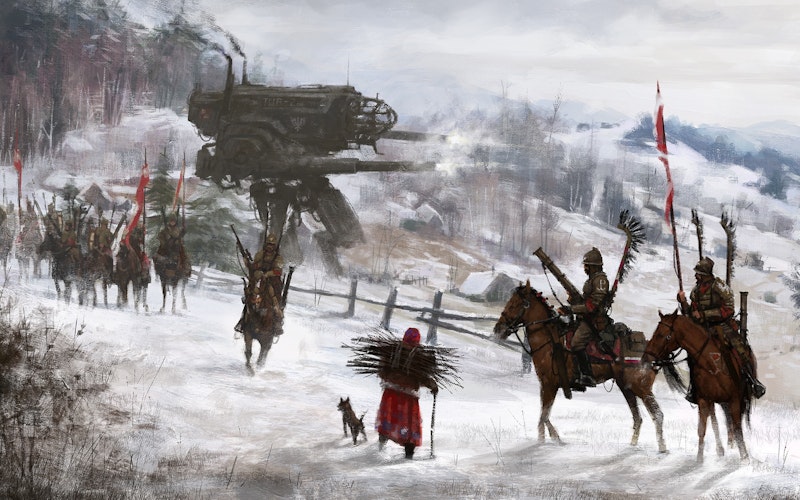
Games
Scythe and the Work of the Church
Scythe is a gorgeous board game that imagines an alternate, post-Great War history, where hardy peasants are protected by grizzled soldiers and towering, armored mechanicals as they work pastoral landscapes. (The breathtaking artwork is by Jakub Rozalski.) The game is much more about the journey than the destination. During that journey, I noticed interesting parallels between various strategies in the game and the experience of the missional church.
In Scythe, players lead desperate factions in a struggle for popularity and power in a post-war landscape. As factions explore the land, their workers range out to exploit resources; meanwhile, immense dieselpunk mechanicals drive competing factions back to their home bases. The game ends immediately when one faction completes a sixth strategic achievement out of a possible 10. The faction with the most money at this point, wins (determined by the faction’s popularity, factored with the number of achievements attained, territories controlled, and resources in hand).
A key characteristic of Scythe is the player’s ability to pursue any number of different strategies to win. A player, for example, can build a faction into a military powerhouse—seizing territories, capturing resources, and sending opponents packing. Or, a player might act the diplomat: make clever promises, quietly produce resources, and covertly bank increased popularity. But either strategy only goes so far. The former actively works against the faction’s popularity (displacing an opponent’s workers costs you popularity), while the latter leaves the faction vulnerable to more aggressive neighbors. Players must carefully throttle investments in military power, factional popularity, territorial possession, and progress toward six achievements. Going all in on any of these can exhaust resources and reduce flexibility, yet attempting to balance them all can have equally limiting effects.
Scythe rewards mastery of its peculiar basic mechanic, but it’s a mastery that proves elusive. During each turn, a player may execute up to two actions: a more general, tactical action—like moving pieces or producing resources—and a corresponding strategic action that requires more resources and delivers a longer-term benefit (such as building mechs or upgrading the efficiency of the tactical actions). These strategic actions can be used up and bring the faction to a point of diminishing returns. As often as possible, the player wants to do both the tactical and the strategic actions every turn. But it’s not easy.
Hard to master or not, crafting creative strategies is where all the fun resides in Scythe. So, what has this got to do with the missional church? To be sure, the mission of the church is not a game and it doesn’t abruptly end when a church hits six strategic accomplishments. Still, allocating resources and enacting strategies are crucial to the local church determined to make an impact in their community for Jesus Christ. Especially for smaller churches, it’s actually very easy to over-extend resources, burn people out, and shift focus inward. When churches try to offer a ministry for every worthy cause, they are somewhat like the Scythe player trying to do everything, but ending up accomplishing very little.
Equally problematic is the over-reliance on a single ministry or event: that VBS program that has pulled in 100 or more kids every summer for the last 30 years or the Christian concert series going on its 20th season. These often bear great fruit early on, but as time passes they become the thing churches do because “that’s what we’ve always done.” Just like in Scythe, singular outreach strategies can end up costing more time, money, and effort for diminishing impact.
Of course, this is just an analogy, and we shan’t wear it out. Scythe has an awful lot going on, even while it is very easy to learn to play. Among its pleasures, I was pleased to discover a helpful lesson about the spiritual life of the local church: doing too much might achieve very little, while focusing too narrowly might shut out other valuable opportunities to share God’s love.
Topics: Games